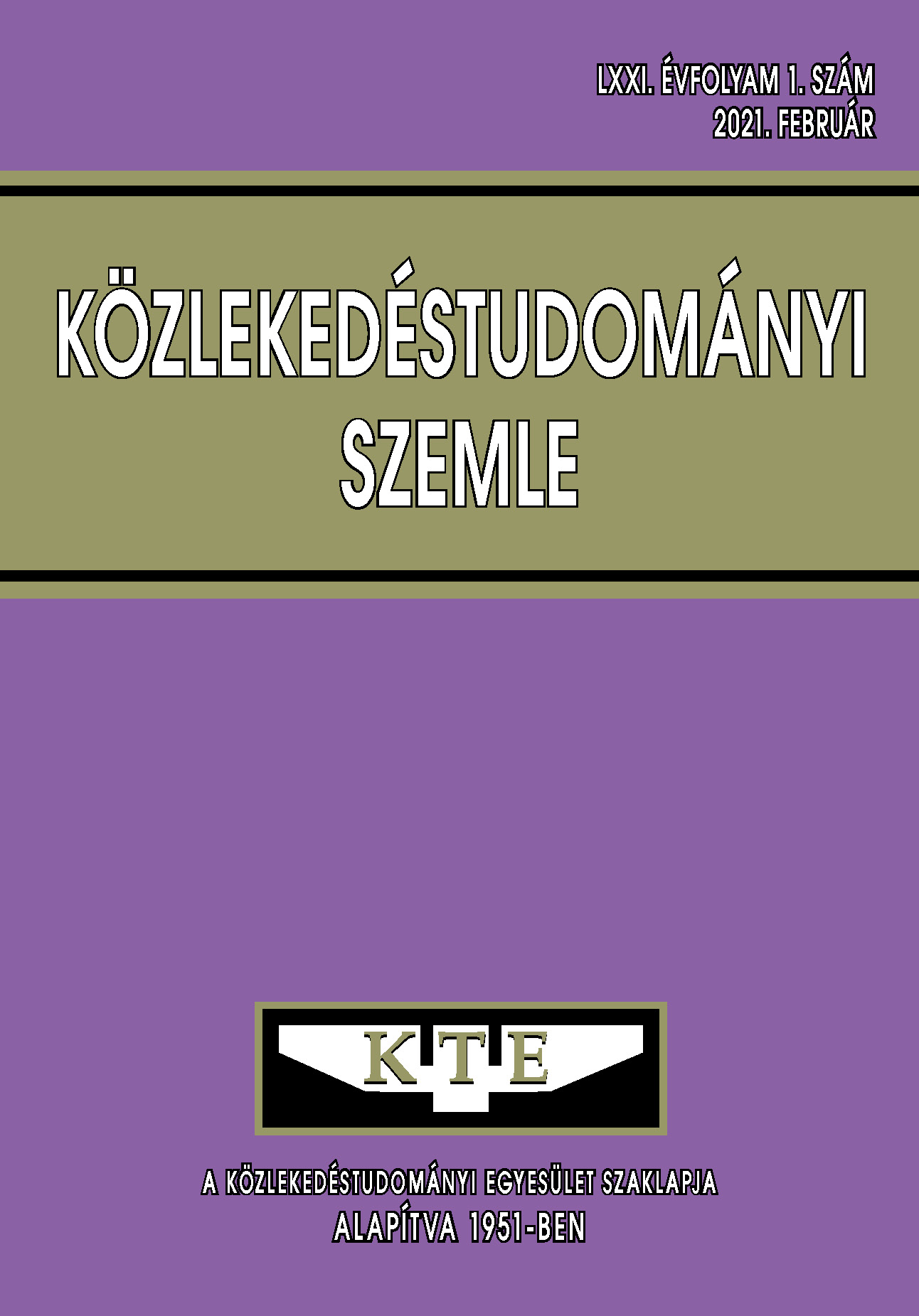A magyar vasút Trianon előtt és azóta
Absztrakt
100 éve történt a magyar történelem talán legnagyobb traumája, a történelmi Magyarország területének harmadolása és hat ország közötti szétosztása oly módon, hogy a kialakított új határok sehol sem találkoznak a korábbiakkal. A régi vicc szerinti kérdés: Hány országgal határos Magyarország? Eggyel: a régivel. Ugyanekkor szűnt meg az 1091. óta fennálló perszonálunió Horvátországgal. A történteket az elmúlt 100 év alatt sem lehet feledni, de értékelni, magyarázni sokféleképpen lehet. Az írás a vasúthálózat szempontjából ad fontos, szinte a teljeskörűséget biztosító információkat.
Hivatkozások
A magyar vasút krónikája a XX. században MÁV Zrt. 2005.
Magyar vasúttörténet 6. 7. MÁV Rt. Budapest, 1998, 1999.
Az 1921. évi XXXIII. törvénycikk az 1920. évi június hó 4. napján a Trianonban kötött békeszerződés becikkelyezéséről
Dr. Kerkápoly Iván: Vasúti földrajz és történet Budapest, 1943.
Az 1947. évi XVIII. törvény a Párizsban 1947. évi február hó 10. napján kelt békeszerződés becikkelyezése tárgyában
Imre Perger: The History of Railway Passenger Transportation in Hungary – From the Monarchy to the Twenty First Century Eastern, European Railways in Transition Nineteenth to Twenty-first Centuries (szerkesztette Ralf Roth és Henry Jacolin, Ashgate 2013. 87-99 pp.
Imre Perger: Die Personenbeförderung mit der Bahn in Ungarn von der Monarchie bis zum XXI. Jahrhundert IRHA Konferencia előadás Pozsony, 2009. 09. 24.
Miniszterelnöki Hivatala Kisebbség- és nemzetpolitikáért felelős szakállamtitkárság nemzetpolitikai ügyek főosztálya: Varratmentes Európa II. Vasúti határátmenetek vizsgálata 2009. Készítette: Káldi István, Kovács Gábor Endre, Perger Imre, Piros András
Balla László térképei
Javaslat a Magyar Királyi államvasutak hálózatán a háború lezajlását követő legközelebbi években szükséges beruházásokról és a hálózat továbbfejlesztésekről Budapest, 1916.
A MÁV Zrt, a GYSEV Zrt és a MÁV-START Zrt 2018. évi beszámolója
A Vasúti infrastruktúra, közlekedési eszközök, üzemi és szállítási teljesítmények adatai (OSOP 1812) MÁV Zrt, GYSEV Zrt, MÁV-START Zrt 2017. és 2018. év
https://www.mavcsoport.hu/mav-start/nemzetkozi-utazas (letöltve: 2020. 02. 10.)
https://www2.gysev.hu/ (letöltve: 2020. 02. 12.)
Az elektronikusan megjelenő cikkek nyílt hozzáféréssel rendelkeznek (OJS), online ingyenesen elérhetők és letölthetők. A cikkek szerzőit nem terheli megjelentetési vagy kiadási költség (APC). Felhasználóknak joguk van a cikkek olvasására, letöltésére, másolására, kinyomtatására, valamint azokban való keresésre, vagy a teljes szöveg linkkel történő megosztására.
A szerzőknek nyilatkozniuk kell arról, hogy beadványukat korábban nem tették közzé más folyóiratban, a pénzügyi támogatás feltüntetésre került és a hivatkozások listája teljes és pontos, beleértve az URL-ek és a DOI-k specifikációját is (ha rendelkezésre állnak). A cikktervezet beadásakor minden szerző jóváhagyja a benyújtott változatot. A szerzők garantálják, hogy a cikk az ő eredeti művük. A szerzők kötelesek részt venni a szakértői értékelés folyamatában, követni a bírálók tanácsait, betartani az előírt határidőket, és amennyiben előfordulnak, kötelesek visszavonni a benyújtást vagy kijavítani a hibákat.
Minden beadott cikket szakértői értékelés alá kerül, ahol a szerkesztők független értékelést kérnek legalább egy szakértőtől, ügyelve arra, hogy a bíráló(k)nak ne legyen összeférhetetlensége a szerzőkkel. A végső döntést a főszerkesztő hozza meg, aki figyelembe veszi az értékeléseket és a szerkesztők javaslatait. A szerkesztők és a lektorok bizalmasan kezelik a beadványt.
A kiadó és a szerkesztők elkötelezettek a magas etikai normák betartása mellett, és megakadályozzák azokat a publikációkat, amelyekben kutatási visszaélés történt. Az ilyen etikai kérdésekben a COPE irányelveit követik.
A szerzők fenntartják a szerzői jogokat, és megadják a folyóiratnak az első közzétételi jogot a Creative Commons Licenc alapján (https://creativecommons.org/licenses/by-nc-nd/4.0), amely lehetővé teszi mások számára, hogy megosszák a művet, elismerve a mű szerzőségét és a folyóiratban való első közzétételt.
A folyóirat archiválja az összes megjelent cikket, és a folyóirat tulajdonosa, a Közlekedéstudományi Egyesület továbbra is üzemelteti az adatbázist abban az esetben is, ha a folyóirat kiadása megszűnik.















